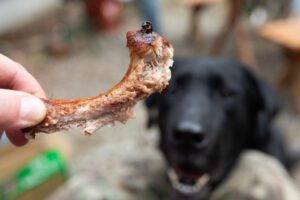What To Do If Your Dog Ate Chicken Bones
We’ve all been there—turn your back for one second and Fido has snagged that leftover chicken bone from the dinner table. Panic sets in; what do you do next? We at Apex Vets in Silver Spring, MD, are here to help guide you through this stressful moment.

Why Chicken Bones Are a No-No for Dogs
We get it, dogs love bones. But let’s dig into why chicken bones are particularly risky.
Risk of Splintering
Chicken bones, especially when cooked, are more brittle than other types of bones. This makes them prone to splintering, posing a choking hazard or causing internal damage.
Gastrointestinal Complications
Even if your dog manages to swallow a chicken bone without immediate harm, there’s still a risk of intestinal blockage or punctures. This could lead to severe complications requiring emergency medical attention.
Nutritional Imbalance
Believe it or not, too much of a good thing can be bad. While bones do have some nutrients, they can also be high in fat and can disrupt a balanced diet if consumed regularly. This can lead to gastroenteritis (inflammation in the intestines) or pancreatitis (inflammation within the pancreas) which can be painful and cause your dog to vomit or stop eating.
Immediate Steps to Take After Your Dog Eats a Chicken Bone
Uh-oh, the deed is done. Now what? The most crucial thing you can do right now is not to panic. Your dog will pick up on your anxiety, which may make the situation worse.
- Avoid DIY Treatments: You might be tempted to Google some home remedies. Please resist this urge. Without proper medical training, you could unintentionally make the situation worse.
- Observe for Symptoms:
- Immediately: Keep a close eye on your dog for any signs of distress such as gagging, choking, drooling, or pawing at the mouth. This could be an indication that the bone has gotten stuck in the esophagus or mouth so if these symptoms are observed, call your vet.
- Over the next 72 hours: Watch out for vomiting, inappetence, bloody stool, abdominal pain, bloating and straining to defecate. Check your dog’s stool regularly for signs that the bones are passing. Bring your dog in if they are feeling unwell.
- Contact Your Veterinarian: Contact your veterinarian immediately if you observe any of the symptoms above. Each case is different so it is important to contact your veterinarian. Apex Vets in Silver Spring, MD, is always here to assist you. We have experienced veterinarians who can guide you through this frightening experience.
Keep Calm and Call Apex Vets
Alright, folks, remember, accidents happen. The important thing is to know how to respond to ensure your fur baby’s safety. If you find yourself in this scary situation, keep calm and call Apex Vets. We are committed to providing top-notch care for your beloved pets.
Remember, if you’re in the Silver Spring, MD, area and you’re looking for a reliable veterinary practice, Apex Vets is the name you can trust.
Feel free to share this blog with other dog parents. The more we know, the better we can care for our furry family members!
Disclaimer: This blog is not a substitute for professional veterinary advice. Always consult your veterinarian for any health concerns regarding your pets.
